
Vittorio De Sica was an Italian film director and actor, a leading figure in the neorealist movement.

Telefoni Bianchi films, also called deco films, were made by the Italian film industry in the 1930s and the 1940s in imitation of American comedies of the time in a sharp contrast to the other important style of the era, calligrafismo, which was highly artistic. The cinema of Telefoni Bianchi was born from the success of the Italian film comedy of the early 1930s; it was a lighter version, cleansed of any intellectualism or veiled social criticism.
The Nastro d'Argento is a film award assigned each year, since 1946, by Sindacato Nazionale dei Giornalisti Cinematografici Italiani, the association of Italian film critics.

Maddalena, Zero for Conduct is a 1940 Italian "white-telephones" comedy film directed by Vittorio De Sica. It is a remake of the Hungarian film Magda Expelled (1938).
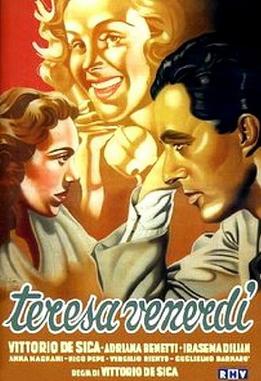
Teresa Venerdì is a 1941 Italian "white-telephones" comedy film directed by Vittorio De Sica. It is a remake of the Hungarian film Rézi Friday.
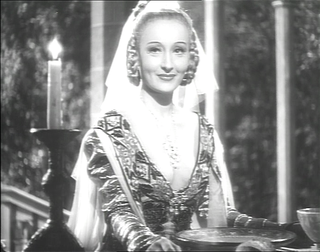
Clara Calamai was an Italian actress.

Full Speed is a 1934 Italian comedy film directed by Mario Mattoli and starring Vittorio De Sica, Milly and Camillo Pilotto. It was shot at the Cines Studios in Rome. The film's sets were designed by the art director Gastone Medin.
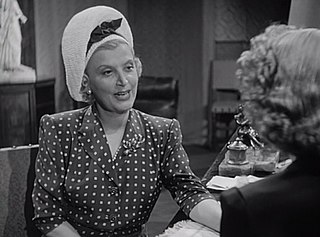
Giuditta Rissone was an Italian film actress who appeared in 25 films between 1933 and 1966. She was born in Genoa and died in Rome. Giuditta Rissone married the director and actor Vittorio De Sica in 1937 in Asti, in the Montferrat region of Piedmont. Her brother Checco Rissone was also an actor.

Invisible Chains is a 1942 Italian drama film directed by Mario Mattoli and starring Alida Valli, Carlo Ninchi and Giuditta Rissone. It was shot at the Cinecittà Studios in Rome. The film's sets were designed by the art directors Ottavio Scotti and Mario Rappini.
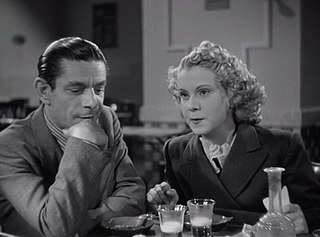
Lively Teresa is a 1943 Italian "white-telephones" comedy film directed by Mario Mattoli and starring Lilia Silvi, Roberto Villa and Carlo Ninchi. It was produced in the style of the White Telephone comedies popular during the Fascist era.

Cameriera bella presenza offresi... is a 1951 Italian film directed by Giorgio Pastina. Federico Fellini was one of its scriptwriters. The film marked the comeback of Elsa Merlini after a nine years hiatus.
Red Roses is a 1940 Italian "white-telephones" comedy film directed by Vittorio De Sica and Giuseppe Amato and starring De Sica, Renée Saint-Cyr, and Vivi Gioi. It was De Sica's first film as a director. De Sica had previously appeared in a 1936 production of the stage play by Aldo De Benedetti on which it was based. It was shot at the Cinecitta Studios in Rome. The film's sets were designed by the art director Gastone Medin.

Two Happy Hearts is a 1932 Italian "white-telephones" comedy film directed by Baldassarre Negroni and starring Vittorio De Sica. It is known for its modernist set designs.

The Jester's Supper is a 1942 Italian historical film directed by Alessandro Blasetti and starring Amedeo Nazzari, Osvaldo Valenti and Clara Calamai. It was based on a play of the same title by Sem Benelli, which had later been turned into an opera by Umberto Giordano. Like the play, the film is set in the 15th century Florence of Lorenzo the Magnificent and portrays a rivalry that leads to a series of increasingly violent practical jokes.

Castles in the Air is a 1939 Italian "white-telephones" comedy film directed by Augusto Genina and starring Lilian Harvey, Vittorio De Sica and Otto Treßler. It was made at Cinecittà in Rome, as part of a co-production with Germany. A separate German-language version was also released. It is based on a novel by Franz Karl Franchy.

Goodbye Youth is a 1940 Italian "white-telephones" drama film directed by Ferdinando Maria Poggioli and starring María Denis, Adriano Rimoldi and Clara Calamai. The film was adapted from the 1911 play of the same name by Nino Oxilia and Sandro Camasio, which had been adapted into films on three previous occasions. The film was a breakthrough role for Calamai who emerged as a leading star of Italian cinema during the 1940s. It was made at the Cinecittà studios in Rome and the Fert Studios in Turin.

Francesco "Checco" Rissone was an Italian film, stage and television actor.
The Last Five Minutes is a 1955 French-Italian comedy film directed by Giuseppe Amato and starring Linda Darnell, Vittorio De Sica and Peppino De Filippo. It is also known by the alternative title of It Happens in Roma.

Departure is a 1938 Italian comedy film directed by Amleto Palermi and starring Vittorio De Sica, María Denis and Giovanni Barrella. It was shot at the Cinecittà Studios in Rome.
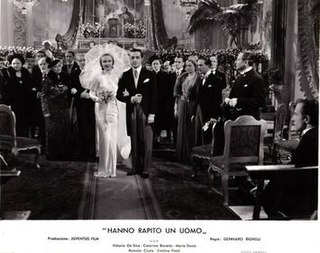
They've Kidnapped a Man is a 1938 Italian white-telephone comedy film directed by Gennaro Righelli and starring Vittorio De Sica, Caterina Boratto and Maria Denis. It was shot at the Cinecittà Studios in Rome. The film's sets were designed by the art director Alfredo Montori.
















